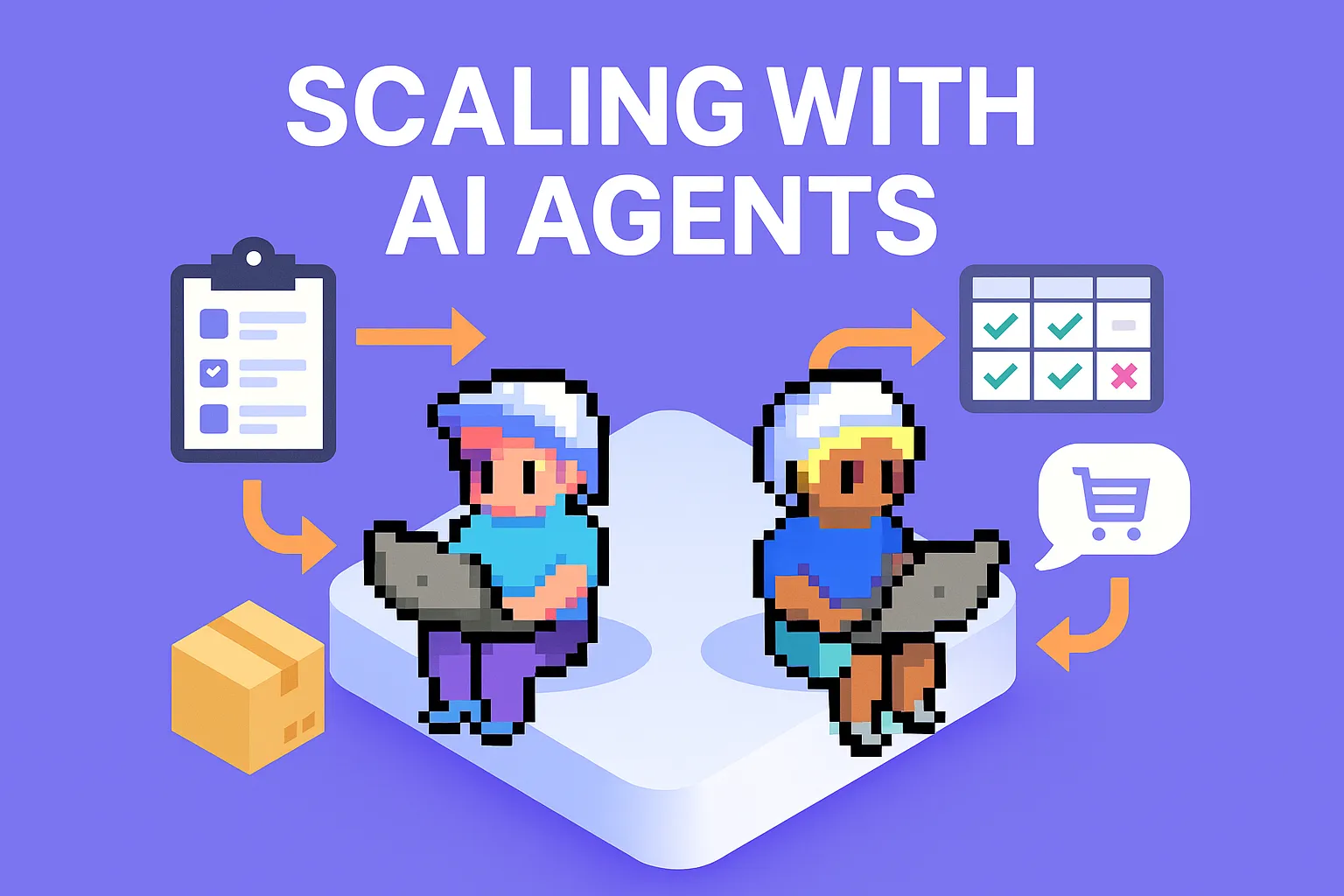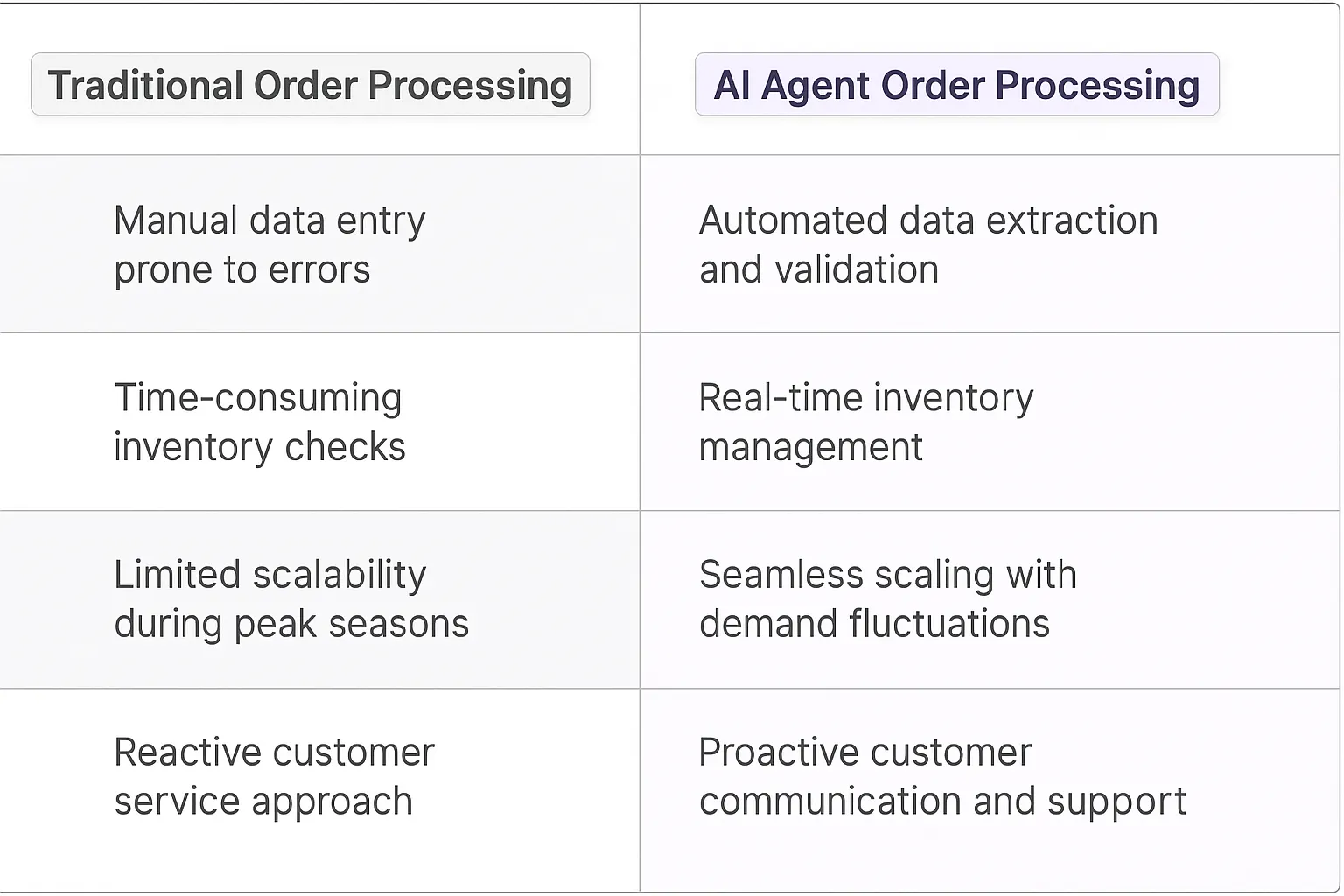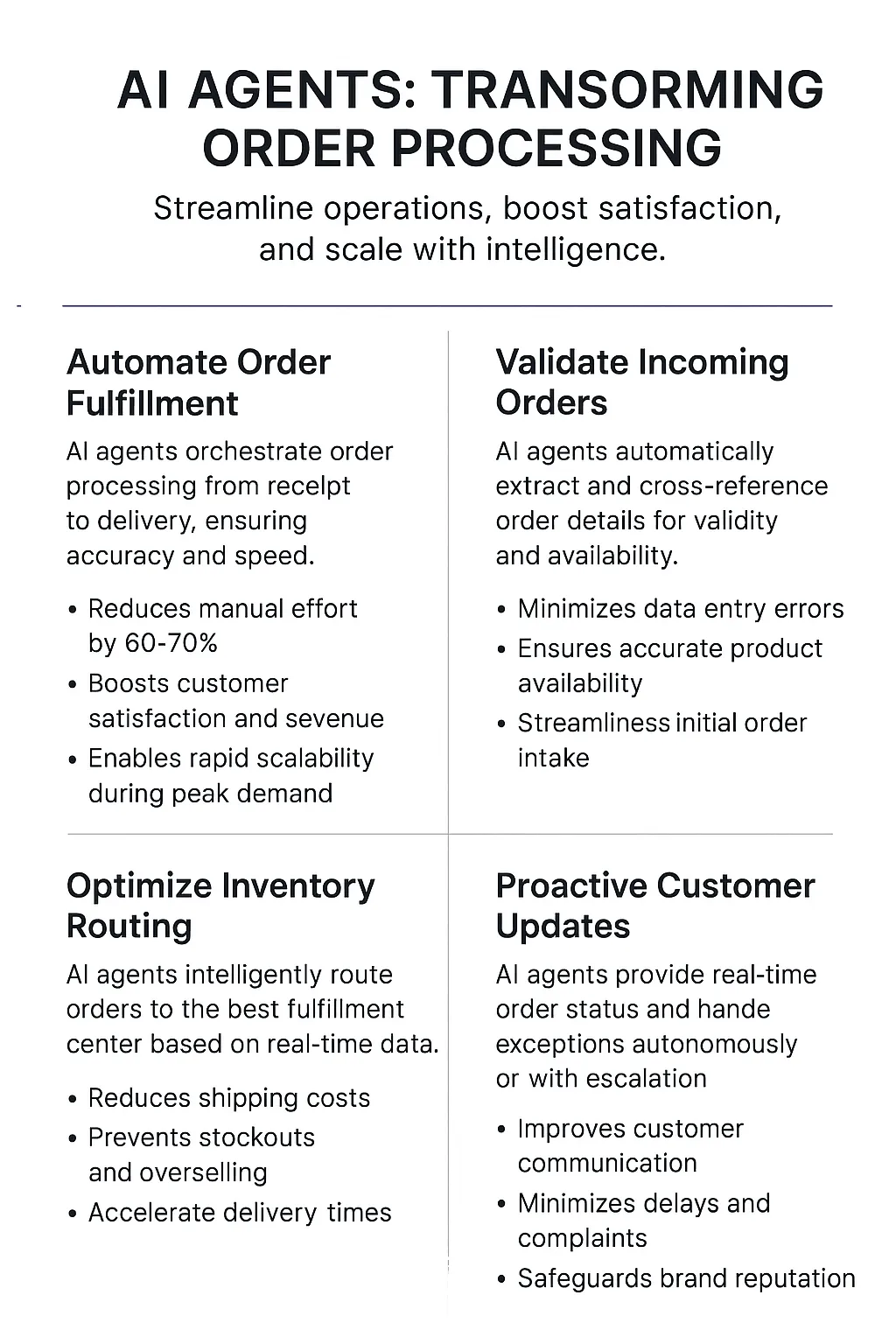Order Processing AI Agents
The Evolution of Order Processing with AI Agents
What is Order Processing?
Order processing is the backbone of any business that sells products or services. It's the series of steps that occur from the moment a customer places an order to when they receive it. This includes everything from inventory checks and payment processing to shipping and delivery coordination. In the past, this was a labor-intensive process prone to human error and inefficiencies. Now, AI is changing the game.
Key Features of Order Processing
Modern order processing systems powered by AI agents offer a suite of game-changing features. They provide real-time inventory updates across multiple warehouses, ensuring accurate stock levels. These systems can automatically validate orders, flagging potential issues before they become problems. They offer predictive analytics, helping businesses anticipate demand and optimize inventory. Perhaps most importantly, they integrate seamlessly with other business systems, creating a unified, efficient workflow that can scale with your business.

Benefits of AI Agents for Order Processing
What would have been used before AI Agents?
Before AI agents entered the scene, order processing was a tedious, manual slog. Companies relied on armies of human workers to input data, check inventory, and update shipping statuses. It was like trying to build a skyscraper with a hammer and nails – slow, error-prone, and incredibly inefficient.
Legacy systems and outdated software patches cobbled together over decades created a Frankenstein's monster of order management. Customer service reps spent hours on the phone, juggling multiple screens and databases just to answer basic questions. It was a nightmare for everyone involved – customers, employees, and businesses alike.
What are the benefits of AI Agents?
AI agents are the secret weapon that's transforming order processing from a bottleneck into a competitive advantage. These digital teammates are like having a team of superhuman workers who never sleep, never make mistakes, and can handle thousands of orders simultaneously.
First off, AI agents crush it when it comes to data entry and validation. They can extract information from emails, PDFs, and even handwritten forms with scary accuracy. This alone eliminates countless hours of mind-numbing work and reduces errors that can cascade through the entire supply chain.
But the real magic happens when AI agents start making decisions. They can instantly check inventory across multiple warehouses, calculate optimal shipping routes, and even predict potential issues before they occur. It's like having a crystal ball for your supply chain.
Customer service gets a massive upgrade too. AI agents can handle routine inquiries 24/7, freeing up human reps to tackle complex issues that require empathy and creativity. And because these digital teammates are constantly learning, they get better at their jobs every single day.
The knock-on effects are huge. Faster order processing means happier customers and fewer canceled orders. More accurate inventory management reduces waste and improves cash flow. And with AI handling the grunt work, your human team can focus on high-value tasks that drive growth.
In the end, AI agents for order processing aren't just about cutting costs or improving efficiency. They're about fundamentally changing the game. Companies that embrace this tech will be able to scale faster, adapt quicker, and deliver a level of service that was previously impossible. It's not just an upgrade – it's a whole new operating system for commerce.

Potential Use Cases of AI Agents with Order Processing
Processes
Order processing is ripe for AI-driven optimization. Digital teammates can transform this traditionally labor-intensive workflow into a seamless, efficient operation. They're not just handling tasks; they're reshaping entire processes.
Take order validation, for instance. An AI agent can instantly cross-reference incoming orders against inventory levels, customer credit history, and shipping logistics. It's not just about speed - it's about making decisions that humans might miss in the rush of daily operations.
Then there's the realm of exceptions handling. We've all dealt with those orders that don't quite fit the mold. AI agents can categorize these outliers, apply predefined rules, and even learn from past resolutions to handle future exceptions more effectively. This isn't just automation; it's adaptive problem-solving at scale.
Tasks
At the task level, AI agents are game-changers for order processing. They're not replacing humans; they're amplifying human capabilities in ways we're only beginning to explore.
Consider data entry - the bane of many an order processing team. AI agents can extract information from various document formats, populate order forms, and even flag discrepancies for human review. This isn't just about reducing errors; it's about freeing up human creativity for higher-value tasks.
Customer communication is another area where AI shines. These digital teammates can draft order confirmations, provide shipping updates, and even handle basic customer inquiries. The key here is personalization at scale - something that's been the holy grail of customer service for years.
Inventory management tasks also get a boost from AI. These agents can predict stock levels based on historical data and current trends, triggering reorder alerts before humans even realize there's a potential shortage. It's like having a crystal ball for your supply chain.
The beauty of AI in order processing isn't just in what it can do today, but in its potential for continuous learning and improvement. As these digital teammates handle more tasks and processes, they'll uncover patterns and insights that can drive further optimizations. We're not just talking about incremental gains here - we're looking at the potential for exponential improvements in efficiency and customer satisfaction.
In the end, AI agents in order processing aren't about replacing human workers. They're about creating a symbiotic relationship where machines handle the repetitive, data-intensive tasks, allowing humans to focus on strategy, creativity, and complex problem-solving. It's a future where order processing isn't just a necessary evil, but a strategic advantage in the quest for customer loyalty and operational excellence.

Industry Use Cases for Order Processing AI Agents
AI agents are reshaping order processing across industries, and their impact is far more nuanced than most realize. These digital teammates aren't just automating tasks; they're fundamentally altering how businesses approach customer interactions, inventory management, and supply chain dynamics.
What's particularly fascinating is how these AI agents adapt to industry-specific challenges. They're not one-size-fits-all solutions, but rather chameleons that morph to fit unique sector needs. From e-commerce giants to mom-and-pop shops, AI is quietly revolutionizing order processing in ways that are both subtle and profound.
Let's dive into some concrete examples that illustrate how AI agents are transforming order processing across different industries. These cases go beyond surface-level efficiency gains, revealing how AI is creating new possibilities and reshaping business models.
E-commerce: Transforming Order Processing with AI
The e-commerce industry is ripe for disruption through AI-powered order processing. Let's dive into how these digital teammates can reshape the landscape.
Consider a high-volume online retailer dealing with thousands of orders daily. Traditionally, this meant an army of human workers manually reviewing orders, checking inventory, and initiating fulfillment processes. It's a recipe for errors, delays, and frustrated customers.
Enter AI order processing agents. These digital powerhouses can ingest order data at lightning speed, cross-reference inventory levels in real-time, and initiate fulfillment workflows without breaking a sweat. But that's just scratching the surface.
The real magic happens when these AI agents start to learn and adapt. They can identify patterns in ordering behavior, predicting demand spikes before they happen. This allows for proactive inventory management, reducing stockouts and overstocking simultaneously.
Moreover, these AI agents can detect anomalies that might indicate fraud or shipping errors, flagging them for human review. This targeted approach allows human workers to focus on high-value tasks that require nuanced decision-making, rather than drowning in a sea of routine order processing.
The result? A leaner, meaner e-commerce operation that can scale effortlessly during peak seasons, maintain high customer satisfaction, and operate with unprecedented efficiency. It's not just about processing orders faster; it's about fundamentally reimagining the entire order fulfillment ecosystem.
As these AI agents continue to evolve, we can expect to see even more sophisticated capabilities. Imagine AI that can dynamically adjust pricing based on real-time demand, or that can personalize order processing workflows based on individual customer preferences.
The e-commerce giants of tomorrow won't just be using AI for order processing; they'll be building their entire operations around these digital teammates. It's a shift that promises to redefine what's possible in online retail, creating new winners and leaving those who fail to adapt in the dust.
Manufacturing: AI Agents Redefining Production Efficiency
The manufacturing sector is on the cusp of a major transformation, and AI order processing agents are leading the charge. This isn't just about automating a few tasks; it's about fundamentally reshaping how production lines operate.
Take a large automotive manufacturer dealing with complex supply chains and just-in-time production schedules. Traditionally, order processing involved a labyrinth of spreadsheets, phone calls, and manual data entry. It was slow, error-prone, and struggled to adapt to sudden changes in demand or supply disruptions.
AI order processing agents flip this model on its head. These digital teammates can simultaneously monitor incoming orders, current inventory levels, supplier capacity, and production schedules. They're not just processing data; they're orchestrating a symphony of moving parts in real-time.
When a large order comes in, these AI agents can instantly assess its impact on the production schedule. They can identify potential bottlenecks, suggest optimal production sequences, and even initiate communications with suppliers to ensure timely delivery of necessary components. It's like having a hyper-intelligent production manager working 24/7, making decisions in milliseconds that would take human teams hours or days to process.
But the real game-changer is how these AI agents learn and improve over time. They start to recognize patterns in order flow, correlating them with external factors like economic indicators or weather patterns. This predictive capability allows manufacturers to anticipate demand fluctuations and adjust production accordingly, minimizing waste and maximizing efficiency.
Moreover, these AI agents can integrate with IoT sensors on the production line, creating a feedback loop that continuously optimizes the manufacturing process. If a machine is showing signs of wear, the AI can preemptively adjust the production schedule to avoid downtime. If a particular product configuration is causing quality issues, the AI can flag it for engineering review.
The result is a manufacturing ecosystem that's not just more efficient, but more resilient and adaptive. It can pivot on a dime to meet changing market demands, weather supply chain disruptions, and consistently deliver high-quality products on time.
As these AI agents evolve, we'll see them take on even more complex tasks. Imagine AI that can dynamically redesign products based on real-time feedback from the production line and market demand. Or AI that can orchestrate entire supply chains, optimizing not just individual factories but entire industrial ecosystems.
The manufacturers who embrace these AI order processing agents won't just be more efficient; they'll be playing a different game entirely. They'll be able to offer levels of customization, speed, and reliability that their competitors can't match. It's a shift that will separate the leaders from the laggards in the manufacturing world of tomorrow.
Considerations
Technical Challenges
Implementing an Order Processing AI Agent isn't a walk in the park. It's more like trying to teach a toddler quantum physics while juggling flaming torches. The first hurdle? Data integration. Your AI needs to seamlessly connect with multiple systems - inventory management, customer databases, payment gateways. It's like trying to get your grandma, your tech-savvy cousin, and your hipster barista to have a coherent conversation.
Then there's the beast of natural language processing. Your AI needs to understand customer queries that range from "I want that shiny thing" to "Can I get a refund for the product that made my cat sneeze?" It's not just about understanding words; it's about grasping context, intent, and the subtle nuances of human communication. Imagine teaching a robot to understand sarcasm - that's the level of complexity we're dealing with.
Let's not forget about scalability. Your AI needs to handle a trickle of orders one day and a tsunami the next. It's like building a bridge that can support both a bicycle and a freight train. And security? That's a whole other can of worms. You're dealing with sensitive customer data, payment information, and business intelligence. One slip-up, and you're not just facing angry customers; you're staring down the barrel of regulatory nightmares.
Operational Challenges
On the operational front, things get even spicier. First up: change management. Introducing an AI Order Processing Agent is like dropping a cat into a room full of pigeons. Your team, comfortable with their existing processes, suddenly needs to adapt to this new digital teammate. It's not just about training; it's about shifting mindsets and overcoming the "we've always done it this way" syndrome.
Then there's the delicate dance of human-AI collaboration. You need to strike a balance where the AI handles the grunt work, freeing up humans for complex problem-solving and relationship building. But draw that line wrong, and you'll either have underutilized humans or an overworked AI making costly mistakes. It's like trying to choreograph a ballet where half the dancers are robots - exciting, but fraught with potential missteps.
Don't underestimate the challenge of continuous improvement. Your AI isn't a set-it-and-forget-it solution. It needs constant fine-tuning, learning from new data, adapting to changing market conditions. It's like raising a child that never stops being a teenager - always learning, often unpredictable, and occasionally infuriating.
Lastly, there's the elephant in the room: ROI justification. Implementing an AI Order Processing Agent is a significant investment. You're not just buying software; you're embarking on a transformational journey. Quantifying the benefits, from improved efficiency to enhanced customer satisfaction, can be as tricky as nailing jelly to a wall. You need to be prepared for the long game, where the true value might not be immediately apparent on a balance sheet.
The Future of Commerce: AI-Driven Order Processing
AI agents are more than just a technological upgrade for order processing - they're a fundamental reimagining of how businesses handle transactions and customer interactions. By automating routine tasks, providing predictive insights, and enabling seamless scalability, these digital teammates are creating a new paradigm in commerce. The companies that embrace this technology aren't just improving their operations; they're positioning themselves to dominate in an increasingly competitive marketplace. As AI continues to evolve, we can expect even more profound transformations in order processing, further blurring the lines between human and machine capabilities. The future of order processing isn't just automated - it's intelligent, adaptive, and customer-centric in ways we're only beginning to explore.













